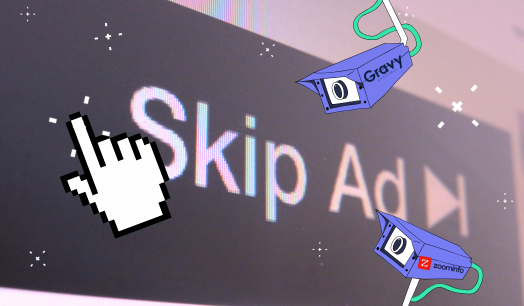
Targeted Ads Aren't Just Annoying, They're A Privacy Nightmare
Targeted Ads Aren't Just Annoying, They're A Privacy Nightmare
Targeted ads pop up everywhere - interrupting videos, cluttering websites, just to get you to buy something that you don’t really need. Annoying? Absolutely. But if you knew just how deeply this system exploits you or how much privacy you’ve already lost, you might see these targeted ads as more than just an inconvenience.
RTB: Where Those Annoying Ads Come From
Let’s say you’re scrolling through Facebook and see an article that looks interesting, so you click on it. As the page loads, an invisible auction sells your data to the highest bidder in the blink of an eye. The winner gets to show you an ad based on what they know about you. Next thing you know, an ad for the Nike Air Force 1’s you’ve been eyeing pops up. It feels almost as if your phone has been listening to you, but it’s far worse than that. Ads are only shown to you after RTB broadcasts your sensitive data to thousands of companies who bid on you without your consent. That’s right, your info gets shown to everyone who bids in this auction, not just the winner.
This happens billions of times every day and exposes details such as your name, location, browsing history, device specs, personal interests, and even private struggles. These auctions are run by ‘ad exchange’ companies, with Google being the biggest player. And again, everyone who bids on you gets your information. You may have technically consented to this when you hit “Accept Cookies”, but we’re sure you didn’t actually know that this was what you were consenting to. Big Tech thrives on keeping you in the dark, using vague privacy policies and buried settings to prey on your data. A 2023 study from Pew Research found that 67% of Americans say they “understand little to nothing about what companies are doing with their personal data.
Ad Targeting: The Info That Gets Shared With Bidders
So how did that advertiser KNOW that you’re a sneakerhead, much less which sneakers you’ve had your eye on? That’s because RTB lets companies use your data to influence your choices, whether you realize it or not. And it’s not just happening in one place - it’s happening across every device you own and every app you use. Social media giants scrape your data and mine it to find actionable patterns in your behavior that can power targeted marketing campaigns for specific segments. Meta collects information about a user’s activity within the apps and websites, such as pages visited, content liked and locations, and stores it in Facebook settings. But it unfortunately doesn’t stop there.
Data brokers, companies you’ve likely never heard of before, also make billions tracking your activity across the web and using that intel for various purposes. What specific information they gather depends on the type of broker. Credit reporting bureaus, for instance, like Experian and TransUnion collect financial information to determine creditworthiness, while advertising brokers like Epsilon and Oracle offer up buckets of consumers they’ve segmented to be targeted by advertisers. There are also data brokers like Gravy Analytics and Near that specialize specifically in gathering data on your location, and firms like ZoomInfo and Spokeo that deal solely with collecting personal data like addresses, emails, and phone numbers. Now that personal data has become an over $200 billion a year industry, there are companies gathering data on every aspect of your life: financial data, purchase history, health and GPS data. They draw insights about your lifestyle, income, preferences, religious or political beliefs, and even your likelihood of charitable giving from the websites you visit, articles you read, and videos you watch.

Real World Consequences
Targeted advertising doesn’t just drain your bank account, it could expose you to discrimination based on race, gender, sexuality, health, and age. It can leave you vulnerable to potential unfair treatment, stigma, and even physical violence. In December of 2024, the Federal Trade Commission took legal action against Mobilewalla, Inc. for collecting and selling data sourced from RTB auctions on over a billion people for invasive purposes. They tracked union organizers and protesters, putting them at risk of job termination, government surveillance, arrest, harassment, and public shaming due to their activism. Mobilewalla has also helped its clients target pregnant women, Hispanic churchgoers, and members of the LGBTQ+ community.
Mobilewalla provided third parties with location data on consumers who visited pregnancy centers and maternity clinics. One group tracked the cell phone IDs (MAIDs) of “abortion-vulnerable” women who visited Planned Parenthood. Then, they served them “life affirming” ads to persuade them to try a scientifically unsupported “abortion reversal” procedure. If you belong to a minority group, you could even face barriers to housing or financial services. Back in 2019, Meta broke the law by restricting who can view housing-related ads based on their ‘race, color, national origin, religion’. Targeted advertising is predatory and could mean you get denied a loan or lose a job opportunity. And the consequences can be even broader, such as when a 2020 report by the Irish Council for Civil Liberties (ICCL) found that an RTB data broker influenced Poland’s 2019 parliamentary election by targeting LGTBQ+ people with tailored ads to suppress votes and sway public opinion. Let’s also not forget the infamous Cambridge Analytica scandal.
What can you do?
Data privacy experts say that deleting your data from brokers can be deliberately complex, frustrating, and time-consuming…but it is possible. Start by identifying who is collecting your data and then submit opt-out requests. Opt-out links and instructions are readily available for most of the major data brokers directly on their websites. You can also file formal complaints, if necessary. And if you don’t want to go through the frustration of doing this research and submitting all those requests yourself, there are now services you can hire to do that work for you. Our friends at PCMag even have a list of the best personal data removal services for 2025.
But as you probably gathered, it’s very challenging to delete your information once it’s out there. And while you can’t fully hide from behavioral targeting, you can learn new habits and develop to keep your data as private as possible: decline cookies and use tools like secure browsers, VPNs, and tracker blockers. Use burner or alias email addresses (like StartMail’s unlimited aliases) when you shop or sign up for services so you can keep your real one safe. Our friends at EFF built a free browser extension to block online trackers and they offer detailed guides on how to disable your mobile advertising ID and audit app permissions. Beyond that, organizations like Electronic Frontier Foundation (EFF), American Civil Liberties Union (ACLU), Irish Council for Civil Liberties (ICCL), and Center for Digital Democracy (CDD) are by your side making moves to protect your privacy. You can show support to these nonprofits through donation.
It’s easy to look at our current system of “surveillance capitalism” and feel overwhelmed, scared, and even hopeless. But now that you’re armed with knowledge, you have several tools to protect yourself! You are not a product, you're a human being, and now you have what it takes to be part of the solution!
More from the blog


Top 10 Situations to Use a Burner Email Address Instead of Your Real One
Continue reading
How AI Threatens Your Email Privacy - And What You Can Do About It
Continue reading
6 Ways That Companies Violate Your Data Privacy
Continue reading